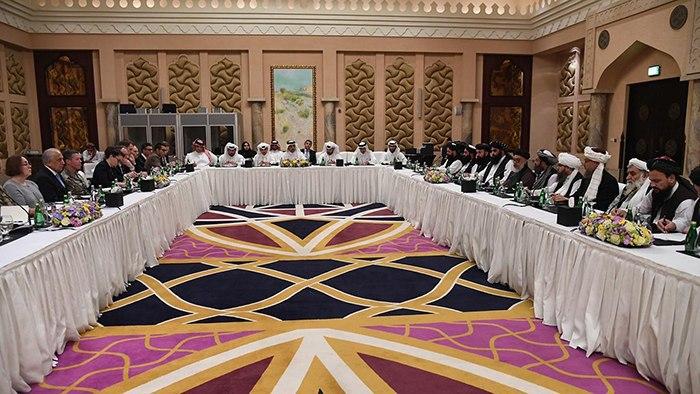Following the 11th round of talks with the Taliban, US Special Representative for Afghanistan Reconciliation Zalmay Khalilzad separately briefed leaders of the National Unity Government (NUG), President Ghani and Chief Executive Abdullah, on Saturday, February 01, in Kabul.
“No significant progress has been made in talks with the Taliban,” Media Directorate of the Office of Chief of Staff to the Afghan President quoted Khalilzad as saying in a statement. “We are waiting a clear Taliban response on a practical mechanism for ceasefire or significant and permanent reduction of violence that is acceptable for the Afghan people and the US government.”
Statement by the US chief negotiator comes while almost a week ago the two negotiating parties expressed optimism over US-Taliban agreement on “reduction in violence.” Spokesperson for the Taliban political office in Qatar, Suhail Shaheen, claimed in a tweet, on January 17, that the Taliban and the US negotiators had talked about signing of agreement and a ceremony for it.
in a tweet posted on December 18, 2019, Khalilzad said that they were approaching an “important stage in the Afghan peace process”.
According to a statement issued by Office of the Chief Executive, Khalilzad has stressed on formation of an all-inclusive negotiating team able to represent all Afghan parties in peace talks with the Taliban. Abdullah has also reiterated that peace efforts must not be monopolized.
The US and the Taliban have hitherto held 11 rounds of official talks in Doha during which the process has faced some very serious setbacks at times. After the two negotiating sides conclude their 9th round of talks in the Gulf state, US President Donald Trump, in a surprise tweet, called off the talks earlier in September 2019 and cancelled a secret meeting set to be held with President Ghani and the Taliban representatives in the Camp David. The decision was made after a Taliban car bomb killed 12 people, including a US service member in Kabul.
The halt in US-Taliban talks lasted more than three months. In his first and surprise Thanksgiving visit to the largest US Airbase in Afghanistan, Bagram Airbase, Trump announced resumption of the peace talks with the Taliban. Standing alongside President Ghani, the US president said that the Taliban were now willing for reduction in violence and making a ceasefire.
The resumed peace talks stopped following another Taliban car bomb targeted a medical facility close to Bagram Airbase, north of Kabul, on December 14. “When I met Talibs today, I expressed outrage about yesterday’s attack on Bagram, which recklessly killed two and wounded dozens of civilians,” Khalilzad tweeted after the 10th round of talks with the Taliban.
Reduction in violence and ceasefire have been reportedly the main topics discussed in the 10th and 11th rounds of US-Taliban talks. In reaction to the alleged US-Taliban agreement for reduction in violence, the Afghan government, officials close to president Ghani, pronounced it as vague and not practical, reiterating on ceasefire as pre-condition for starting peace talks with the Taliban. The alleged agreement on reducing violence, however, was welcomed by Chief Executive Abdullah and former President Hamid Karzai. The two influential figures accused Ghani of attempting to sabotage peace process.
Former deputy to the High Peace Council, Habiba Sarabi, believes that the US has given more leverage to the Taliban in peace process. “The most important part of negotiations is managing the expectations. The expectations need to be managed properly in order to not maximize expectation of the opposing party,” she asserted.
She also believes that absence of the Afghan government at negotiating table has impacted the US-Taliban direct talks. “They must have consulted with representatives of Afghanistan for considering all the expectations,” she said.
Ms. Sarabi further stated that the US-Taliban agreement on reduction in violence actually suggests US setback from its pre-conditions as Khalilzad had said in January, 2019, that “nothing is agreed until everything is agreed.” The US chief negotiator had made it cleare that “everything” must include an intra-Afghan dialogue and comprehensive ceasefire.
A former Taliban official, Sayed Akbar Agha, however, argues that the US-Taliban talks is overshadowed by issues such as tensions between US and Iran, withdrawal of US troops from Iraq upon the country’s parliament vote, and Trump’s impeachment. “I urge both parties, particularly Khalilzad and his colleagues, that Afghanistan should not be sacrificed for Iran, Iraq, and Trump’s impeachment,” he asserted.




